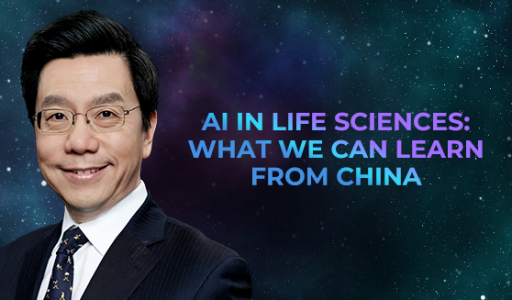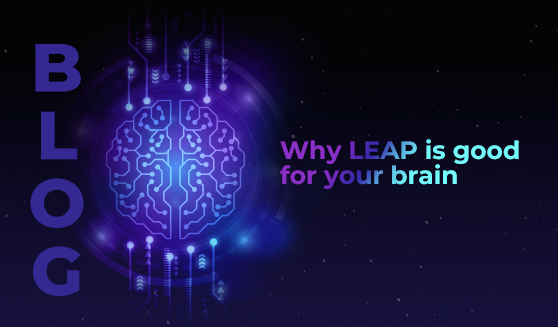
The US is recognised as the current leader in AI research and development – but China is closing the gap. And when it comes to the use of AI in life sciences, China has already edged ahead, as Dr. Kai-Fu Lee (CEO and President at Sinovation Ventures) noted during his keynote at #LEAP22.
China produced about a third of all AI journal papers and AI citations worldwide in 2021, according to McKinseyreported (back in February 2021) that China was emerging as a global leader in AI. And as of September 2021, data from WIPO indicated that China had filed 389,571 AI patents in the preceding ten years – that’s an impressive 74.7% of all AI patents globally.
The race to AI is an interesting one, because while there will be immense economic benefits to being a leading nation in this area of tech, there’s also an infinitely large human impact ahead. You’ll know this if you’ve been reading our blog for a while, but we’re really into collaboration at LEAP – and right now, there’s a lot to learn from China about AI in science and health.
AI acceleration driven by COVID-19
Dr. Kai-Fu Lee gave credit to China’s phenomenal AI education, and the tenacity of the country’s entrepreneurs – and he also noted that COVID-19 facilitated an acceleration in the pace of AI development. The virus needed to be contained, and the answer to effective containment lay in effective testing. Instead of relying on human effort, China rolled out automated PCR tests – with a fully automated nucleic acid testing system – which can process 120,000 tests per day (10X faster than humans) with zero staff infections.
The success of this program is feeding into the expansion of automation in life science labs, where AI can, for example, speed up the monoclonal process from 116 hours (when humans do it) to just 15 hours. Then onwards, into cell biology, stem cell research, molecular biology, synthetic biology, immunology – and “traditional drug discovery will become obsolete,” Dr. Kai-Fu Lee said, “because AI drug discovery is much faster and cheaper.”
If all laboratories (across universities and medical research facilities, drug companies, and pharmaceutical manufacturers) are automated, then:
-
Money will be saved, because the cost of hiring technicians will be significantly reduced
-
Scientists’ time can be spent on innovation and major breakthroughs, because they won’t have to dedicate hours/weeks/months to repetitive tasks and standardised experiments
-
The invention of new drugs, or identification of existing drugs for the treatment of specific diseases, will be faster – and rare diseases will become treatable
AI doesn’t have to rely on limited human experience to create drugs and treatments, or on a pool of only thousands of patients to identify symptoms and produce a clinical treatment plan. Instead, AI can read data from everywhere, and use an immense volume of experience to predict treatment outcomes.
Research by Deloitte in 2020 suggested that the next three to five years will prove AI’s value, particularly in drug discovery – but across other areas of the value chain, too. “At present,” the report said, “the life sciences industry has only begun to scratch the surface of AI’s potential, primarily applying it to automate existing processes. By melding AI with rigorous medical and scientific knowledge, companies can do even more to leverage this technology to transform processes and achieve a competitive edge.”
Clearly, use of AI in life sciences has economic sway. But it also has a huge potential value impact in terms of human lives.
Biomedical engineer Guangyu Wang, as reported by Nature, was part of a team that worked to develop machine-learning software to detect respiratory disease during the pandemic. The algorithm they developed has since been successful in reducing the workload of radiologists across six hospitals – and the data and code have been given to an open-access data platform called the China National Center for Bioinformation (CNCB).
But this didn’t just happen out of nowhere. The motivation to develop machine learning in this way, and to share it collaboratively for the collective good, is linked to China’s long-term planning and investment in AI and centralised data – and scientists, clinicians, and medical workers are proactive about cooperating because they know it’ll reduce pressure at point-of-service.
After the start of China’s 12th Five Year Plan in 2011, the central government invested over USD $1.5 billion in the use of information tech to improve healthcare; and since 2010, additional funding has continued to drive research and development in this area. The National Natural Science Foundation of China tripled its research budget from $4.6 billion in 2006-2010 to $13.7 billion in 2011-2015, then increased again to $19.6 billion in 2016-2020.
Basically, the Chinese government is making it easier for AI to make healthcare better, and encouraging scientists to work collaboratively in order to drive the speed of development in life sciences data learning.
As we continue to face new challenges born from climate change and regional unrest around the world, the countries and companies that use AI to support vital services will have a competitive advantage. And they’ll also have the potential to make a real, meaningful impact on human life and on the planet. We think those two things – economic success and meaningful impact – will increasingly go hand-in-hand in the future.








